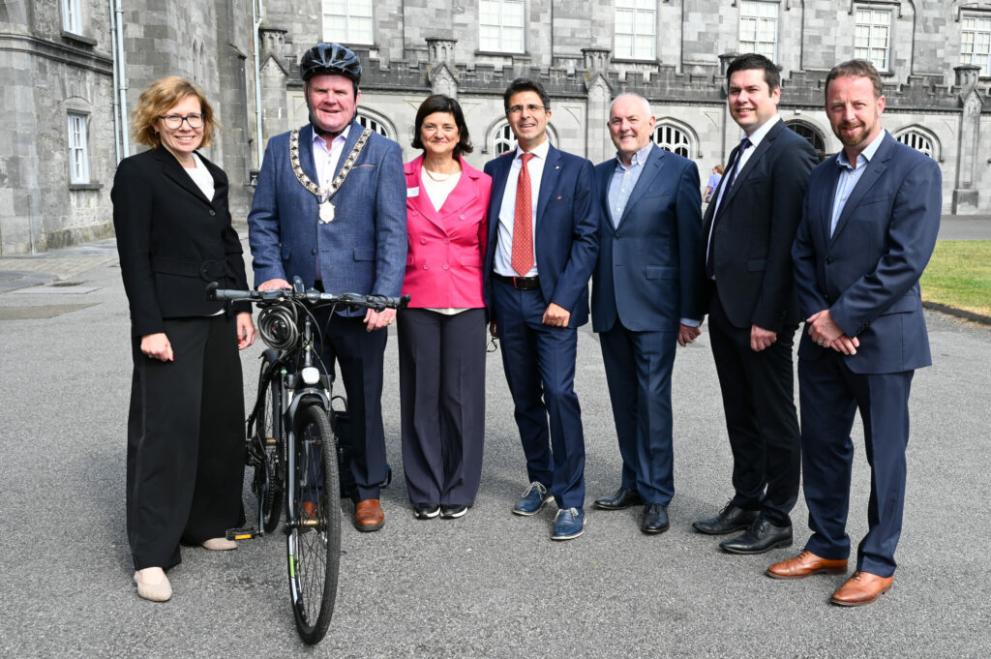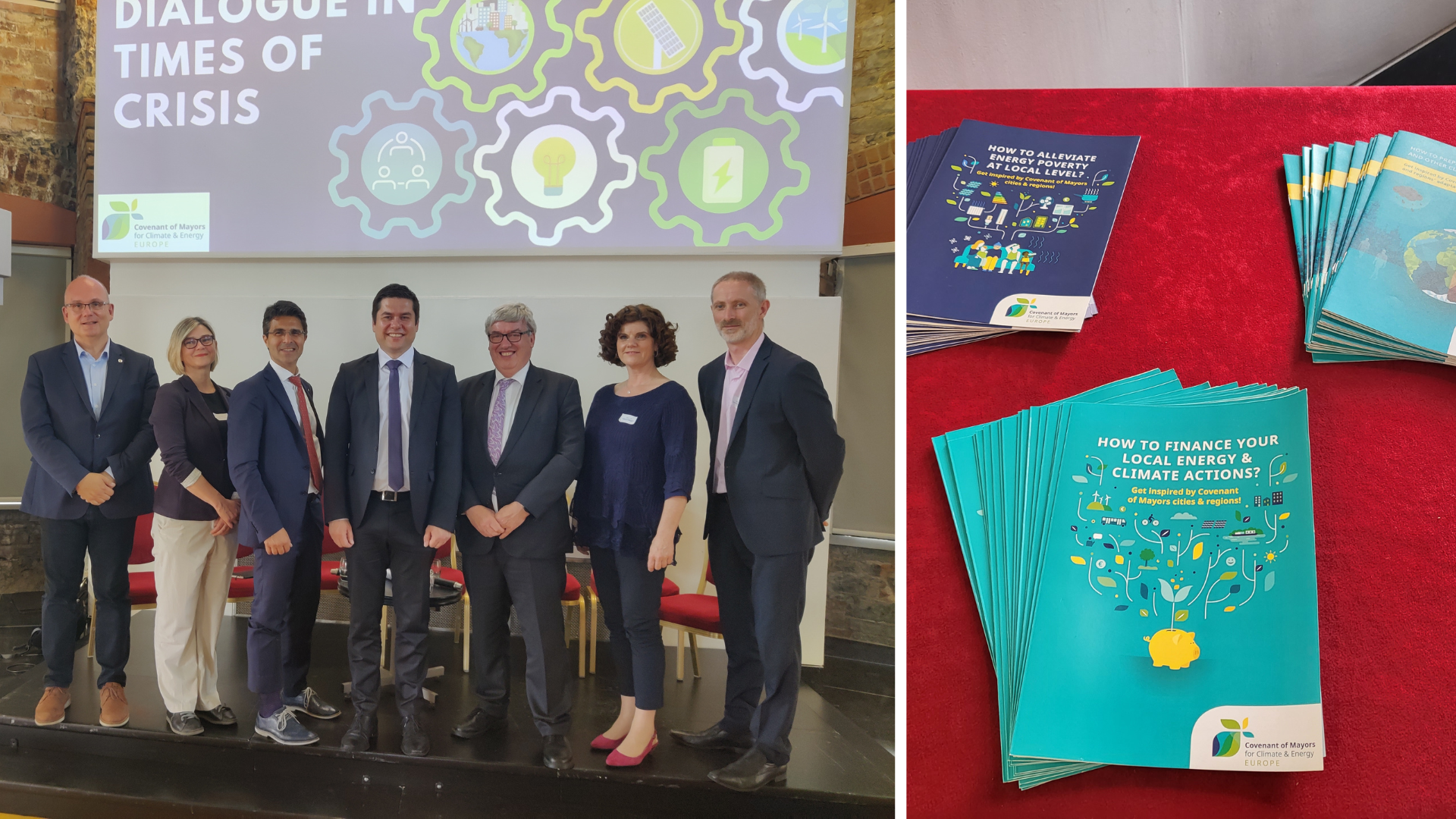
“We need good politics in times when sustainable energy is no longer alternative energy but mainstream energy”, Julije Domac, Covenant Board Member, Special Advisor of the Croatian President, FEDARENE President.
This is how Julije Domac opened the Covenant policy workshop on multi-level governance dialogue that took place last 13th of June, 2023, in the astonishing location of the medieval castle of Kilkenny, Ireland. 67 representatives of national Parliaments, energy agencies, regions and local authorities from all over Europe debated on the roles of policies and politics in the climate neutral journey of our territories and on why and how they are sometimes perceived as barriers instead of enablers of the energy transition.
“Reducing carbon is just the starting point. We need to change behaviours and we need to link actions to policies more and more”, John Carley, Covenant Supporter, Chair of South-East Ireland Energy Agency.
The policy workshop was marked by the shining examples of 2 mayors: Joe Malone, Mayors of Kilkenny, arriving to the workshop by bike to show that change is possible and lead by example; and Vlasta Krmelj, Mayor of Selnica ob Dravi, Slovenia, already director of the Energy and Climate Agency of Podravje, who decided to run for local elections to make her city climate neutral.
“After 10 years of pushing policy- and decision-makers to do more for carbon neutrality, I decided to do it myself and run for mayor of Selnica ob Dravi. Because mayors can do everything and follow what energy agencies are suggesting and pushing them to do”, Vlasta Krmelj, Covenant Signatory, Mayor of Selnica ob Dravi.
A joint voice raised from the audience and the panellists: mayors and cities need to be equipped with tools and knowledge to make energy efficiency decisions. Lack of skilled workforce, especially in the construction chain, is a well-known barrier to the energy transition, which, combined with the lack of climate-related skills of decision- and policy-makers and civil servants, makes extremely hard for cities to implement climate actions and increase the resilience of their territories.
“There are staff and capacities issues. We have contractors who are very busy and prices which are unpredictable, making the implementation of actions complicated. We have families with low income for whom asking to adopt carbon reduction actions can be difficult, as they have other priorities. But we (South-East Ireland Energy Agency) are working with local authorities, businesses and communities in general to help them”, John Carley, Covenant Supporter, Chair of South-East Ireland Energy Agency.
National, regional and local policy makers need to work together to create policies. Citizens and local communities shall not be forgotten, and instead included in the dialogue, to make the right compromises and involve everyone in the energy transition. There is a strong need to fill the gap between the regions and the local authorities. Covenant supporters are key allies of local authorities in supporting them developing their SECAPs and enforcing multi-level dialogues with regional and national governments.
To the question on how national governments liaised with local and regional authorities to face the energy crisis and the skyrocketing price of electricity, answers from the panellists and the audience were stressing on the short-term view of some national Governments in implementing actions that brought to immediate good effects, but that are now resulting in increased difficulties for local authorities, businesses and low income families. An example is what is happening in Croatia, where the measure implemented by the Government to support businesses and households resulted in a deficit of the energy company, that took over the difference between the market price of electricity and the one paid by business and households, deficit that shall now be paid by the state, i.e. by all citizens. Another example is what is happening in Italy, where the Government launched a measure to support citizens, but that then resulted in extra profits for the energy company, which are now going to be reinvested and not redistributed to i.e. SMEs that meanwhile had to close their activity because they could afford the electricity bills.
But national policies and measures are not the only ones creating potential barriers to the energy transition of European territories. European policies are sometimes the cause too: in some cases, EU policies that are good and work well for large countries, do not have the same effects in small countries.
“There is a need of energy solidarity among EU countries”. If a country produces more than what it needs, the extra energy should not be sold to other countries with competitive prices, but on a solidarity principle, ensuring affordable prices”, Sandra Bencic, member of the Croatian Parliament.
Energy poverty was also discussed during the policy workshop. The participants advocated on the need to implement policies and funds towards those who cannot afford to implement EE measures. Ireland is a leading example on energy poverty. Here the Government heavily financed energy efficiency measures, focusing on low income people. The renovation rate doubled in the past year and the expectation is to continue the trend for the year to come.
“Electricity is becoming a constitutional right and as such it shall be ensured for everybody, supporting low incomes and households in energy poverty”, Vlasta Krmelj, Covenant signatory, Mayor of Selnica ob Dravi.
Perhaps a new approach to energy is needed by EU and national policy-makers to consider the access to energy as a right that all groups of our society shall benefit from and to reshape the energy market on the needs of the local communities.
“Building communities’ capacities can bring them power to decide how the energy market should look like. Emergency legislations have effects that we cannot foresee and that local authorities are then left to cope with. There is a need of transparency and trust in the energy market”, Paddy Phelan, Covenant Supporter, CEO of the South-East Ireland Energy Agency.
To conclude, EU and national policy-makers should ensure smart policies, taking into account the needs of our communities and the potential negative effects, otherwise they can only bring to new problems.
“Climate disasters don’t care about the money. We are all on the same planet. We will survive, but we need to work together”, Vlasta Krmely, Mayor of Selnica ob Dravi.

Main picture by Vicky Comerford Kilkenny
Details
- Publication date
- 22 June 2023
